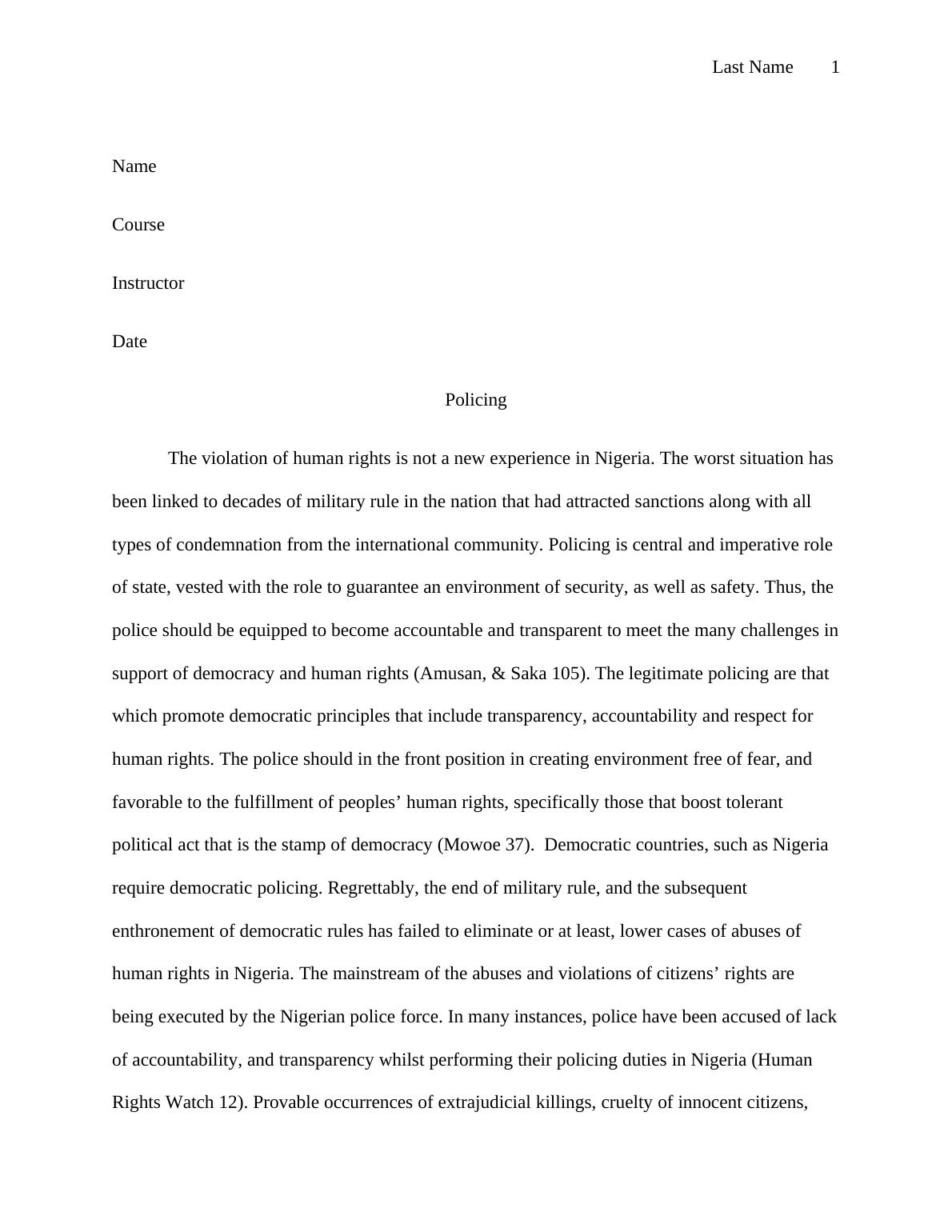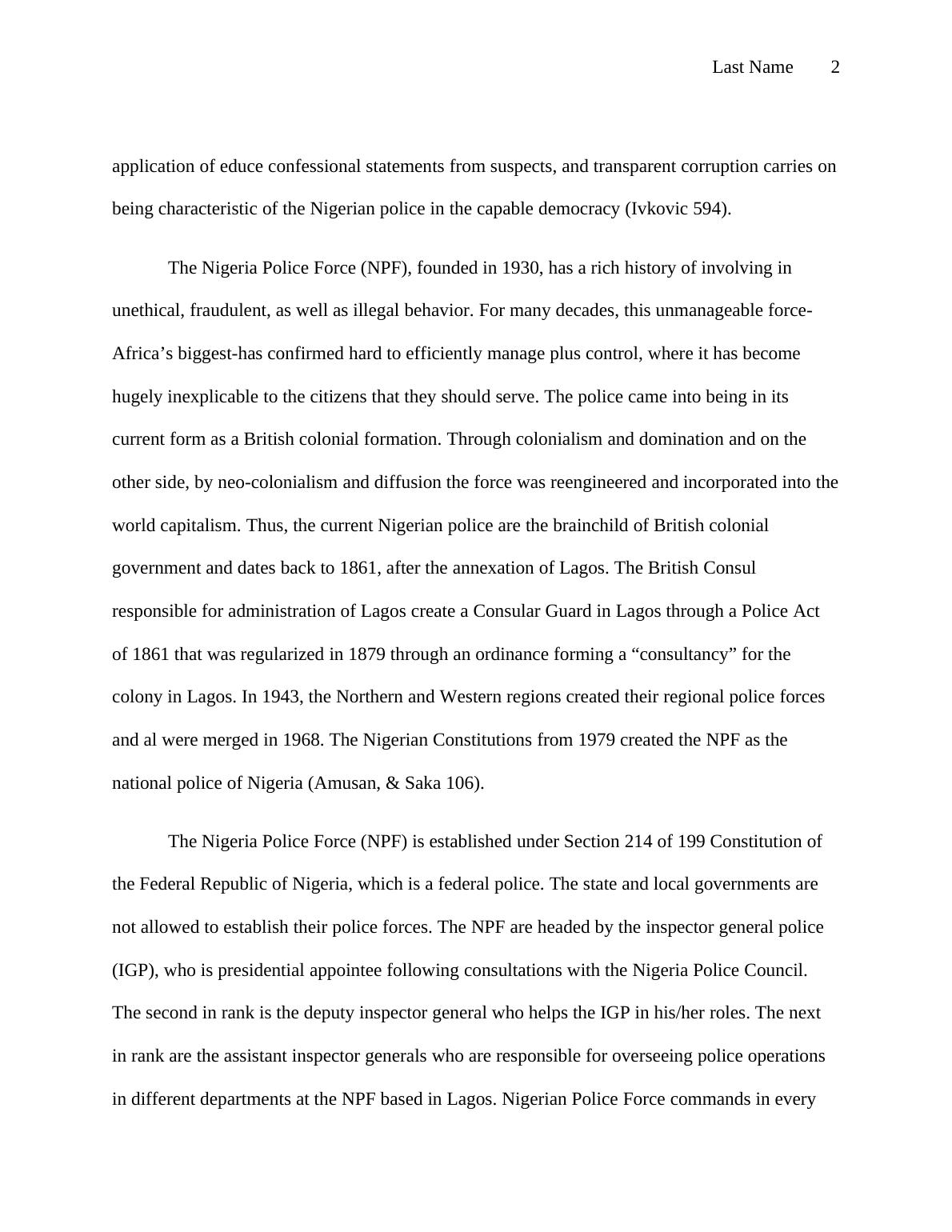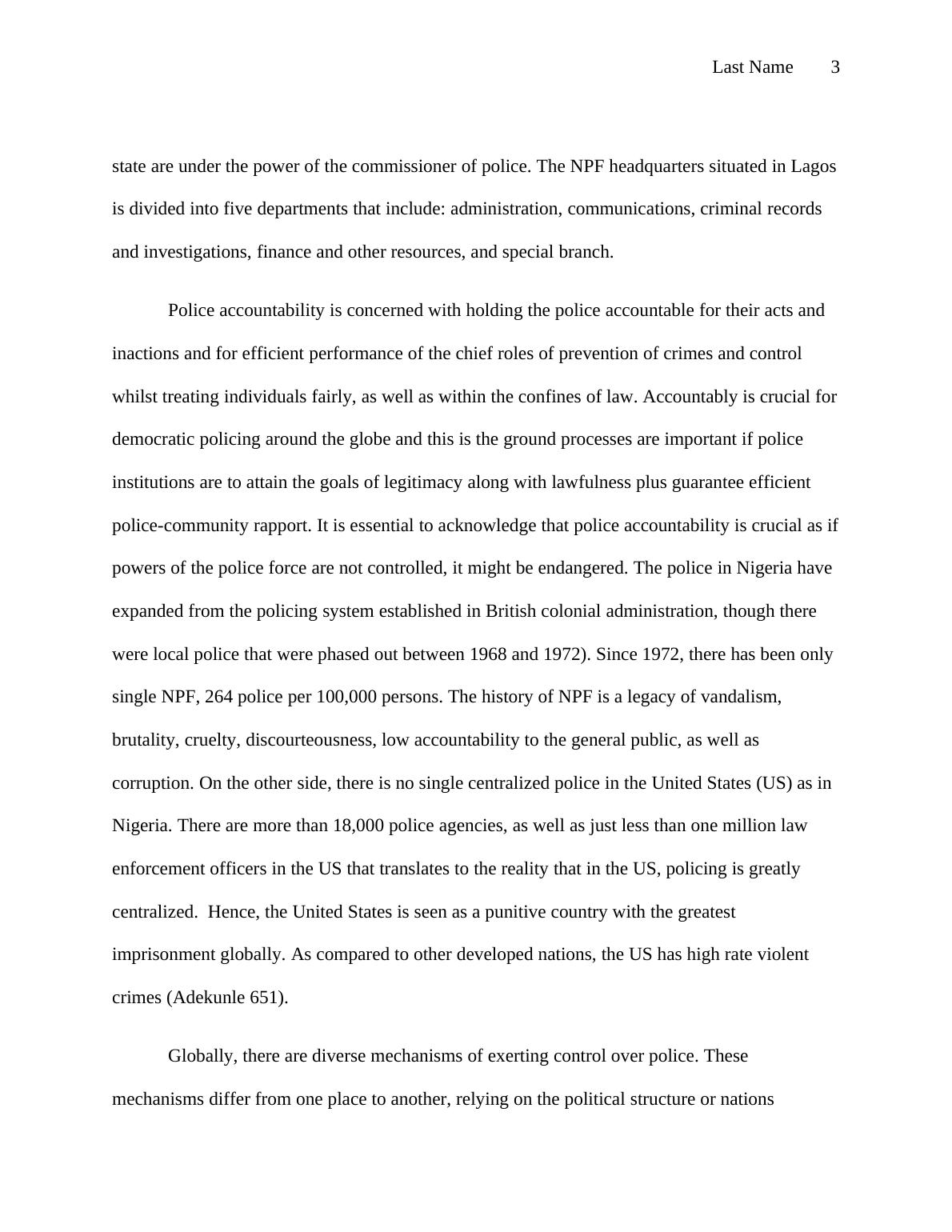violation of human rights PDF
Added on 2021-12-20
9 Pages2632 Words30 Views
Last Name 1
Name
Course
Instructor
Date
Policing
The violation of human rights is not a new experience in Nigeria. The worst situation has
been linked to decades of military rule in the nation that had attracted sanctions along with all
types of condemnation from the international community. Policing is central and imperative role
of state, vested with the role to guarantee an environment of security, as well as safety. Thus, the
police should be equipped to become accountable and transparent to meet the many challenges in
support of democracy and human rights (Amusan, & Saka 105). The legitimate policing are that
which promote democratic principles that include transparency, accountability and respect for
human rights. The police should in the front position in creating environment free of fear, and
favorable to the fulfillment of peoples’ human rights, specifically those that boost tolerant
political act that is the stamp of democracy (Mowoe 37). Democratic countries, such as Nigeria
require democratic policing. Regrettably, the end of military rule, and the subsequent
enthronement of democratic rules has failed to eliminate or at least, lower cases of abuses of
human rights in Nigeria. The mainstream of the abuses and violations of citizens’ rights are
being executed by the Nigerian police force. In many instances, police have been accused of lack
of accountability, and transparency whilst performing their policing duties in Nigeria (Human
Rights Watch 12). Provable occurrences of extrajudicial killings, cruelty of innocent citizens,
Name
Course
Instructor
Date
Policing
The violation of human rights is not a new experience in Nigeria. The worst situation has
been linked to decades of military rule in the nation that had attracted sanctions along with all
types of condemnation from the international community. Policing is central and imperative role
of state, vested with the role to guarantee an environment of security, as well as safety. Thus, the
police should be equipped to become accountable and transparent to meet the many challenges in
support of democracy and human rights (Amusan, & Saka 105). The legitimate policing are that
which promote democratic principles that include transparency, accountability and respect for
human rights. The police should in the front position in creating environment free of fear, and
favorable to the fulfillment of peoples’ human rights, specifically those that boost tolerant
political act that is the stamp of democracy (Mowoe 37). Democratic countries, such as Nigeria
require democratic policing. Regrettably, the end of military rule, and the subsequent
enthronement of democratic rules has failed to eliminate or at least, lower cases of abuses of
human rights in Nigeria. The mainstream of the abuses and violations of citizens’ rights are
being executed by the Nigerian police force. In many instances, police have been accused of lack
of accountability, and transparency whilst performing their policing duties in Nigeria (Human
Rights Watch 12). Provable occurrences of extrajudicial killings, cruelty of innocent citizens,

Last Name 2
application of educe confessional statements from suspects, and transparent corruption carries on
being characteristic of the Nigerian police in the capable democracy (Ivkovic 594).
The Nigeria Police Force (NPF), founded in 1930, has a rich history of involving in
unethical, fraudulent, as well as illegal behavior. For many decades, this unmanageable force-
Africa’s biggest-has confirmed hard to efficiently manage plus control, where it has become
hugely inexplicable to the citizens that they should serve. The police came into being in its
current form as a British colonial formation. Through colonialism and domination and on the
other side, by neo-colonialism and diffusion the force was reengineered and incorporated into the
world capitalism. Thus, the current Nigerian police are the brainchild of British colonial
government and dates back to 1861, after the annexation of Lagos. The British Consul
responsible for administration of Lagos create a Consular Guard in Lagos through a Police Act
of 1861 that was regularized in 1879 through an ordinance forming a “consultancy” for the
colony in Lagos. In 1943, the Northern and Western regions created their regional police forces
and al were merged in 1968. The Nigerian Constitutions from 1979 created the NPF as the
national police of Nigeria (Amusan, & Saka 106).
The Nigeria Police Force (NPF) is established under Section 214 of 199 Constitution of
the Federal Republic of Nigeria, which is a federal police. The state and local governments are
not allowed to establish their police forces. The NPF are headed by the inspector general police
(IGP), who is presidential appointee following consultations with the Nigeria Police Council.
The second in rank is the deputy inspector general who helps the IGP in his/her roles. The next
in rank are the assistant inspector generals who are responsible for overseeing police operations
in different departments at the NPF based in Lagos. Nigerian Police Force commands in every
application of educe confessional statements from suspects, and transparent corruption carries on
being characteristic of the Nigerian police in the capable democracy (Ivkovic 594).
The Nigeria Police Force (NPF), founded in 1930, has a rich history of involving in
unethical, fraudulent, as well as illegal behavior. For many decades, this unmanageable force-
Africa’s biggest-has confirmed hard to efficiently manage plus control, where it has become
hugely inexplicable to the citizens that they should serve. The police came into being in its
current form as a British colonial formation. Through colonialism and domination and on the
other side, by neo-colonialism and diffusion the force was reengineered and incorporated into the
world capitalism. Thus, the current Nigerian police are the brainchild of British colonial
government and dates back to 1861, after the annexation of Lagos. The British Consul
responsible for administration of Lagos create a Consular Guard in Lagos through a Police Act
of 1861 that was regularized in 1879 through an ordinance forming a “consultancy” for the
colony in Lagos. In 1943, the Northern and Western regions created their regional police forces
and al were merged in 1968. The Nigerian Constitutions from 1979 created the NPF as the
national police of Nigeria (Amusan, & Saka 106).
The Nigeria Police Force (NPF) is established under Section 214 of 199 Constitution of
the Federal Republic of Nigeria, which is a federal police. The state and local governments are
not allowed to establish their police forces. The NPF are headed by the inspector general police
(IGP), who is presidential appointee following consultations with the Nigeria Police Council.
The second in rank is the deputy inspector general who helps the IGP in his/her roles. The next
in rank are the assistant inspector generals who are responsible for overseeing police operations
in different departments at the NPF based in Lagos. Nigerian Police Force commands in every

Last Name 3
state are under the power of the commissioner of police. The NPF headquarters situated in Lagos
is divided into five departments that include: administration, communications, criminal records
and investigations, finance and other resources, and special branch.
Police accountability is concerned with holding the police accountable for their acts and
inactions and for efficient performance of the chief roles of prevention of crimes and control
whilst treating individuals fairly, as well as within the confines of law. Accountably is crucial for
democratic policing around the globe and this is the ground processes are important if police
institutions are to attain the goals of legitimacy along with lawfulness plus guarantee efficient
police-community rapport. It is essential to acknowledge that police accountability is crucial as if
powers of the police force are not controlled, it might be endangered. The police in Nigeria have
expanded from the policing system established in British colonial administration, though there
were local police that were phased out between 1968 and 1972). Since 1972, there has been only
single NPF, 264 police per 100,000 persons. The history of NPF is a legacy of vandalism,
brutality, cruelty, discourteousness, low accountability to the general public, as well as
corruption. On the other side, there is no single centralized police in the United States (US) as in
Nigeria. There are more than 18,000 police agencies, as well as just less than one million law
enforcement officers in the US that translates to the reality that in the US, policing is greatly
centralized. Hence, the United States is seen as a punitive country with the greatest
imprisonment globally. As compared to other developed nations, the US has high rate violent
crimes (Adekunle 651).
Globally, there are diverse mechanisms of exerting control over police. These
mechanisms differ from one place to another, relying on the political structure or nations
state are under the power of the commissioner of police. The NPF headquarters situated in Lagos
is divided into five departments that include: administration, communications, criminal records
and investigations, finance and other resources, and special branch.
Police accountability is concerned with holding the police accountable for their acts and
inactions and for efficient performance of the chief roles of prevention of crimes and control
whilst treating individuals fairly, as well as within the confines of law. Accountably is crucial for
democratic policing around the globe and this is the ground processes are important if police
institutions are to attain the goals of legitimacy along with lawfulness plus guarantee efficient
police-community rapport. It is essential to acknowledge that police accountability is crucial as if
powers of the police force are not controlled, it might be endangered. The police in Nigeria have
expanded from the policing system established in British colonial administration, though there
were local police that were phased out between 1968 and 1972). Since 1972, there has been only
single NPF, 264 police per 100,000 persons. The history of NPF is a legacy of vandalism,
brutality, cruelty, discourteousness, low accountability to the general public, as well as
corruption. On the other side, there is no single centralized police in the United States (US) as in
Nigeria. There are more than 18,000 police agencies, as well as just less than one million law
enforcement officers in the US that translates to the reality that in the US, policing is greatly
centralized. Hence, the United States is seen as a punitive country with the greatest
imprisonment globally. As compared to other developed nations, the US has high rate violent
crimes (Adekunle 651).
Globally, there are diverse mechanisms of exerting control over police. These
mechanisms differ from one place to another, relying on the political structure or nations

End of preview
Want to access all the pages? Upload your documents or become a member.
Related Documents
Democracy in Ecuadorlg...
|9
|2211
|484
